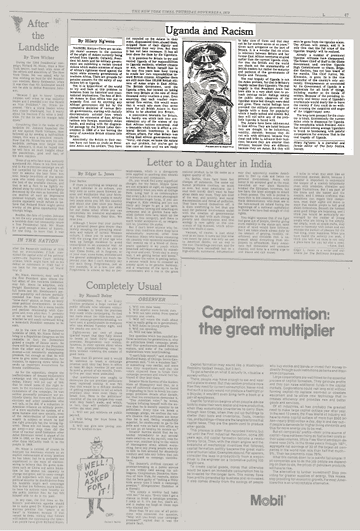
NAIROBI, Kenya—There are no simple moral answers to the question of the plight of Asians currently being evicted from Uganda. Certainly, President Idi Amin and his military government are exhibiting a racism toward Asians which makes nonsense of much of Africa's righteous stand against the racist white minority governments of southern Africa. There are grounds for genuine concern for the safety of any Asians left in Uganda.
Yet it is hypocritical of the world to try and look at this problem in isolation from its historical and international implications. The fate of British Asians in East Africa was put in jeopardy first not by anything any African government did but by the cumulative decisions of various British governments, starting with racially discriminatory colonial laws which placed the economies of East African nations into foreign, essentially Asian hands, and ending with the disgraceful passage by the British Labor Government in 1968 of a law barring the entry of nonwhite British citizens into Britain.
Admittedly the British in their racism have not been as crude as President Amin and his soldiers. They have not rounded up the Asians in their midst, dispossessed them, abused them, stripped them of their dignity and threatened their very lives. But then it has not been necessary. It has all been done for them by the Ugandans.
It is pointless for Britain to try and remind Uganda of her responsibilities to Uganda residents, whether citizens or not, when Britain herself has in the last five years been busy trying to evade her own responsibilities toward British citizens. Altogether there are still more than 100,000 British citizens of Asian origin in East Africa. The British Government, until the Uganda crisis, had insisted on taking them into Britain at the rate of three thousand entry vouchers a year. Even assuming that each voucher represented five entries, this would mean that it would take more than seven years for all British Asians in East Africa to be absorbed into Britain.
A convenient timetable for Britain, but hardly one which took into consideration any of the wishes of the East African nations concerned. And a timetable which was in effect a unilateral British interference in East African affairs. For what Britain was telling East African governments was: “Sorry, old chaps; we know the Asians are our problem, but you've got to take care of them until we are ready to take care of them and that may not be for another seven or so years.” Given such arrogance on the part of Britain, it is a wonder that no crisis in relations between Britain and her former East African territories erupted earlier than the current Uganda crisis. For this the British and the world can thank not the statesmanship of British leaders but rather the maturity and patience of the governments of Kenya and Tanzania.
Continue reading the main story
ADVERTISEMENT
Continue reading the main story
The real tragedy of Uganda is not the Asian problem, for that is Britain's tragedy rather than Uganda's. The real tragedy is that President Amin has been able in a very short time to unleash pent‐up racist feelings among the public which observers of the Ugandan scene had thought were dead and gone. These racist feelings have provided the military government of Uganda with a base for popularity which it badly lacked and needed. But they will not solve any of the problems Uganda is faced with.
The Asians have been odd‐men‐out in East Africa. They are hated because they are thought to be industrious, wealthy, clannish; because they do not mix with Africans; because they cheat and bribe to advance their business; because they are smarter than Africans; because they are different; because they are Asian. But they will soon be gone from the Ugandan scene. The African will remain, and it is only then that the full scope of the Ugandan tragedy will be realized.
Already a number of prominent Ugandan Africans have disappeared. The former Chief of Staff in the Obote Government and one‐time Uganda High Commissioner to Ghana, Brigadier Opoloto, has not been heard of for months. The Chief Justice, Mr. Kiwanuka, is gone. So is the vice chancellor of the country's only university. Disappearance as announced by the Government of Uganda is a euphemism for all kinds of things, including murder at the hands of soldiers. Because of the pervading insecurity and terror most of Uganda's intellectuals would dearly like to leave the country if they could do so without arousing the suspicions and anger of the trigger‐happy army.
The long‐term prospect for the country is bleak. Economically the current Asian crisis is disastrous for Uganda. The xenophobia which President Amin has aroused among average Ugandans is bound to boomerang, with painful consequences for everyone. That is the real tragedy of Uganda.
Hi! I am a robot. I just upvoted you! I found similar content that readers might be interested in:
https://www.nytimes.com/1972/11/09/archives/uganda-and-racism.html
ok bb again , lets wait for @mirrors to checkout the article
You need to stop blatantly plagiarizing work. It is going to affect you account badly, @elmanaa.
Again this too, is plagiarized. Word for word. Even the word count is equivalent. The work belongs to HILARY NG'WENO
You see, there is no way you can go around but by posting your own work.
Otherwise you will end up getting back listed, and that is not good.
EDIT - As before, i cannot, and will not condone blatant plagiarism. So i will give you a downvote, sadly as i would have wished to use it to support others who create good content.
I will fuck your nasty black ass with ebola
@steemcleaners
Congratulations @elmanaa! You received a personal award!
You can view your badges on your Steem Board and compare to others on the Steem Ranking
Vote for @Steemitboard as a witness to get one more award and increased upvotes!